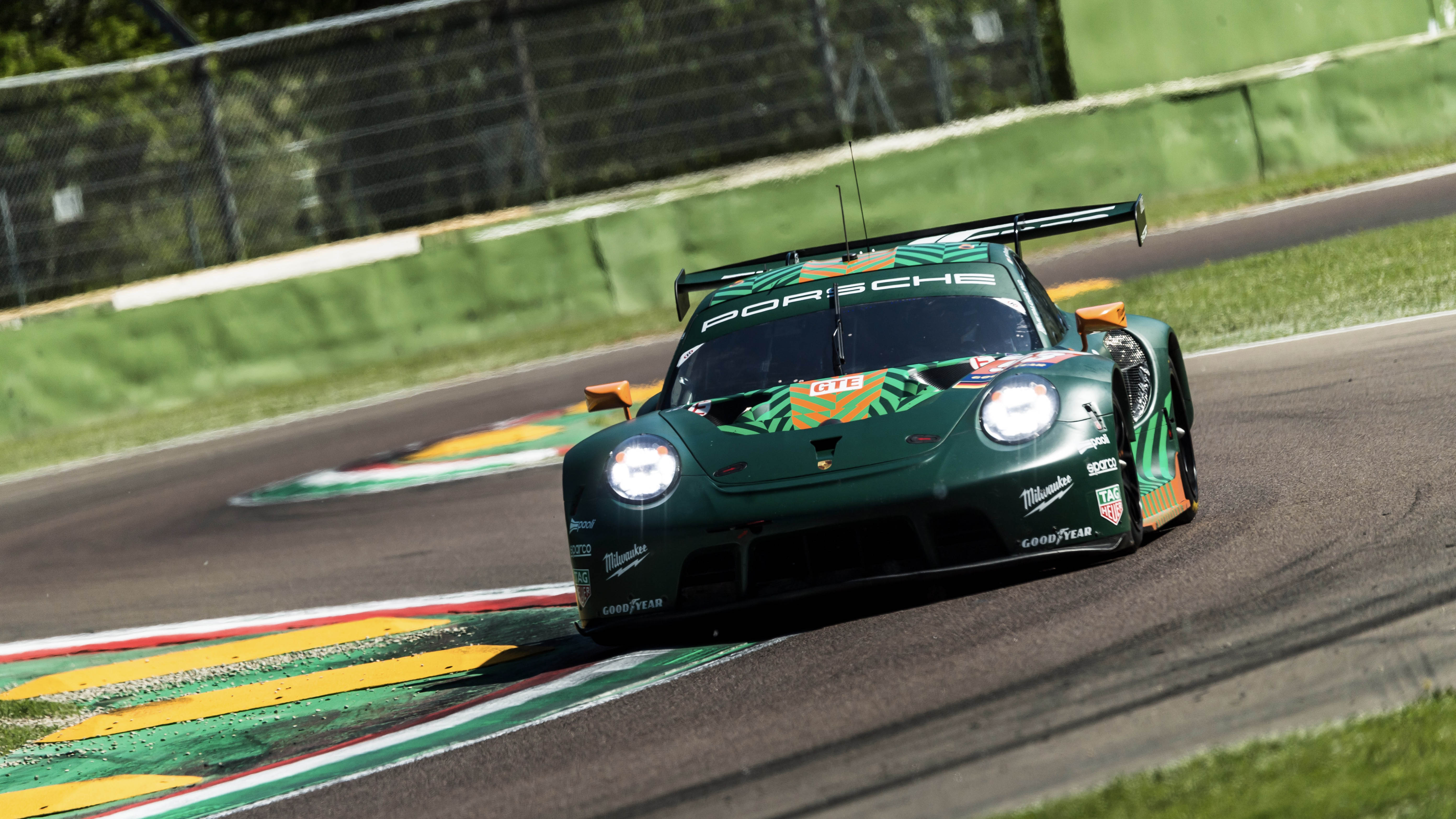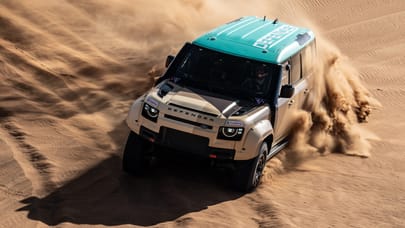
Michael Fassbender: 'being at Le Mans with pro drivers is intimidating'
TG talks to screen star Fassbender who's donned his race overalls for this weekend's 24hr special
"I always wanted to drive," Michael Fassbender says. "Anything with four wheels, basically. I wasn’t really interested in bicycles. All I wanted was one of those little pedal karts. I was always obsessed with cars."
Fassbender is our kind of actor. The sort who grew up in rural Ireland messing about in old cars, idolising Ayrton Senna and Michael Schumacher and loving rallying and Formula One via a motorsport-mad father, mother and grandfather. It’s in the blood, as it is for so many folk in Ireland.
The career detour into acting has served him well, it has to be said. He was mesmerising in Quentin Tarantino’s Inglourious Basterds, fearless in Steve McQueen’s magnificent Hunger, and creepy as hell in Ridley Scott’s Prometheus and Alien: Covenant. He’s just wrapped David Fincher’s new Netflix film The Killer. If Michael Fassbender is in a movie, it’s a nailed-on certainty it’ll be worth watching.
In which respect he’s rather like Steve McQueen, Gene Hackman and Paul Newman, all of whom positively owned whatever film they were in (or shared it in the case of 1974’s ego-busting Newman/McQueen disaster classic The Towering Inferno), and also happened to be seriously good racing drivers off-screen in the real world.
This weekend, Fassbender is aiming to join that elite club – which also includes friend-of-TG Patrick Dempsey – when he contests his first Le Mans 24 Hours race. He’ll be driving a Porsche 911 RSR, car no.93, alongside Canadian Zacharie Robichon and Australian Porsche factory driver Matt Campbell. A graduate of Ferrari’s highly regarded Corse Clienti, the trajectory steepened racing a Porsche with Proton Competition in the European Le Mans Series. He scored his first podium, finishing second at Portimão in 2021, and a third place in Le Castellet in April this year. Now it’s Le Mans, also an occasion for a catch-up with TG.com. "To be honest, I never thought it would be possible," he says. (He’s referring to Le Mans, not the conversation with us.)
TopGear.com: Pro drivers tell me the sunrise stint is one of the best. Where’s your head at?
Michael Fassbender: [Laughs] It’s at not doing the sunrise session! Twilight and dawn are tricky sessions to do, you’ve still got the lights on the car but they’re not really doing very much. Visibility is tricky for me at that time, it’s neither dark nor fully daytime. Obviously it’s a magical thing to observe Le Mans at that time of the morning, when there’s still a good 10 hours of racing left. It’s actually very difficult to put into words, the feeling you get when you’re out on the circuit. There’s an addictive quality to it. The moment I finish the race, I’ll be dying to get back out there again. I know I will.
TG.com: Endurance racing requires an incredible intensity of focus. Does it resemble acting in any way?
MF: Well, they both require you to be super focused, there’s a lot of information to process. But the most important thing is that you have to be relaxed at the same time. The difference for me is that I’ve done my 10,000 hours in front of the camera now, but here I’m still playing catch-up, I’m still behind the curve. I started racing four years ago and now I’m here, at Le Mans, that’s not a lot of time… I’ve done quite a few races, it’s my third season in ELMS, dealing with LMP cars and traffic management, so I’ve got some experience of that. But this is a major place with some of the best drivers in the world, it’s intimidating being on this circuit with them, so it’s a lot to take on board mentally.
TG.com: Is it the most nerve-wracking thing you’ve ever done?
MF: Someone asked me that the other day. I was nervous about the opportunity of doing my first film or the prospect of working with a great director, because I’m trying to make a career out of it, so it’s make or break. I’m never going to be a professional racing driver, but I’m super passionate about it, it means so much to me. And I want to reach my full potential. So it’s a different type of nervousness, it’s a different type of stress. I want more and more seat time so I get to a place where it’s about muscle memory or becomes second nature. I’m still thinking too much in the car, but hopefully that comes with time, I’m processing as much as I can. Proton Competition is a great team, as are my team mates Matt [Campbell] and Zacharie [Robichon]… it’s astounding how quickly he can adapt to the car.
TG.com: Are you planning to double stint?
MF: Oh yeah. It’s not as demanding here as it is at Spa, for example, with its high speed corners and elevation changes. There’s time on the straights here to breathe, and recover your composure.
TG.com: It’s interesting you mention the 10,000 hours thing. The idea of innate talent versus practice and experience… what’s your level?
MF: [laughs] Well I thought I was naturally talented! But as I’ve gone on, I’ve realised not as much as I thought. I’ve seen it in my own industry, people who are just naturally gifted. The real greats for me are the ones who work extra hard: Michael Jordan, Michael Schumacher, Tiger Woods, Lewis Hamilton. These are the people who put in the extra hours. Talent is one thing, and you can have moments of talent. But to do it again and again and become a multiple champion, for me it’s always about the work ethic. In acting, too, I don’t think I’m the most naturally gifted actor, I just work hard, I put in the hours, because the worst feeling for me is to come to something and make a mistake because I haven’t prepared enough. There are enough things that can go wrong that are out of my control. I don’t want any mistakes to be down to my lack of preparation.
Top Gear
Newsletter
Thank you for subscribing to our newsletter. Look out for your regular round-up of news, reviews and offers in your inbox.
Get all the latest news, reviews and exclusives, direct to your inbox.
TG.com: Jackie Stewart always used to say he was in no way a risk taker when he was racing, it was about managing the level of risk...
MF: Absolutely. You saw that with Niki Lauda, too. But it was a different scenario in those days. I don’t think they were out there doing it because they were right on the edge of death, although maybe there’s an element where you feel more alive in those scenarios. Personally, if you’re at 100 per cent and you start going to 102 or 103, there’s only so long you can keep doing that. The most important thing to me is that I don’t damage the car. These cars are sensitive, and if you hit the wrong sort of kerb at the wrong angle you can compromise the rest of your race. It’s a different type of approach to a 30-minute sprint race, for sure.
TG.com: Though it is more of a sprint race in Le Mans these days…
MF: For the pros, but not for me. It would be insane for me to drive at my limit for six hours.
TG.com: You’re a producer, too. Would you make a motor racing film?
MF: There were two things I wanted to do. One was a rally series, the other was Formula One, based around my favourite F1 story. I’m not telling you what it is… it’s so difficult to register the speed in F1. In rallying you can tell because of the trees, houses and walls rushing by. But that feeling of g force in a racing car, that sense when the car is right on the edge of the tyre window, that’s so difficult to translate. On the Le Mans film the story outside the racing was terrible, they didn’t have a script going into shooting. That’s not unusual…
TG.com: Really? I thought it was all about the script…
MF: That’s what they say. But so many movies go into production without a fully finished script, especially the bigger ones, which is kinda nuts. The sad thing on Le Mans was that McQueen and John Sturges fell out, and they had such a good relationship prior to that. They just couldn’t find harmony in the story outside of the car.
TG.com: Some of that film is actually really good.
MF: The tricky thing about making a film about racing is capturing what it’s like in the car. When you’re doing 200mph-plus, it’s difficult to do. And that’s what they managed to do in the Steve McQueen Le Mans film. They really got that right. That stuff you see where they drop a gear, look at each other and pull away… nobody does that. C’mon. Steve McQueen got out of the car during filming and said to Siegfried Rauch [who played his rival, Erich Stahler], ‘you see that bit of swelling on my forehead, the way this vein is really pulsing… that’s something the make-up guy can’t do. That’s why I want everyone in the car doing 200mph…’ They filmed during the race, and the way they did it, even now, was revolutionary.
TG.com: Paul Newman finished second here overall in 1979.
MF: Paul Newman was an amazing driver. More of an advocate for the sport, and still racing into his 80s. Did I ever meet him? Oh, I wish. What a class act. He really committed himself, approached it all with such respect and discipline. And he came late to it, as well…
TG.com: Have you seen Top Gun: Maverick?
MF: Not yet, but I can’t wait. Actually it’s going to be my next date night with my wife [actress Alicia Vikander]. I’m a big Tony Scott fan, I loved the original. What’s great about a film like that is that it’s an event. It’s huge. There aren’t a lot of movies that are a true cinematic experience these days, so I think Maverick is great. Cinema needs that.
Trending this week
- Car Review
BMW 1 Series
- Top Gear's Top 9
Nine dreadful bits of 'homeware' made by carmakers










